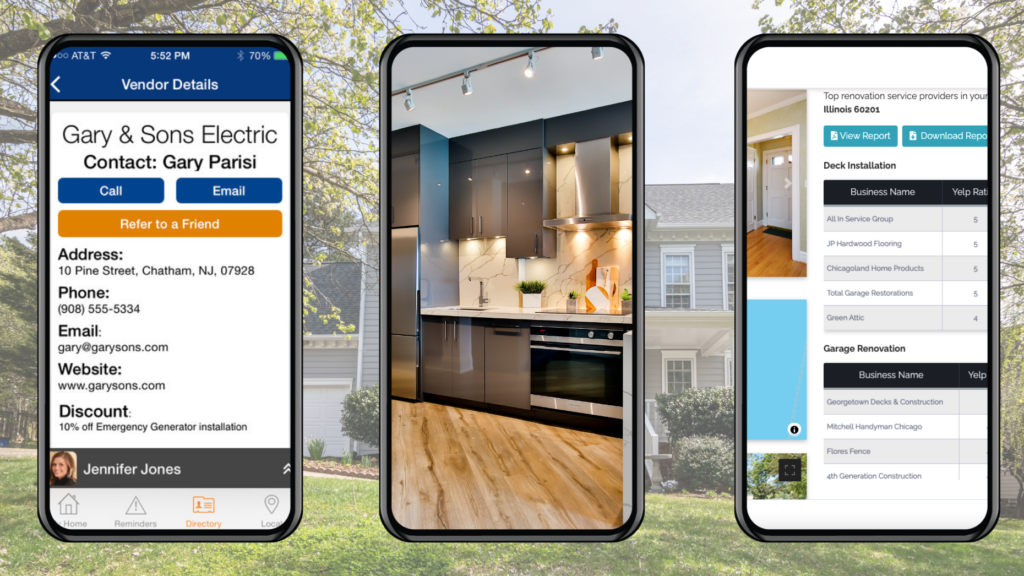Are you receiving Inman’s Agent Edge? Make sure you’re subscribed here for the latest on real estate technology from Inman’s expert Craig Rowe.
One tactic real estate agents rely on to maintain their relationship with clients after they become homeowners is the gift of a home management app.
These tools come in multiple iterations, but all tend to rely in some way on the homeowner being reminded of what they need to do to maintain their new asset. (Some will be better at it than others.)
Agent-branded emails or push notifications for online content are common deliverables, as are dashboards that allow the consumer to add images of appliances, track renovations and notate regular maintenance tasks and general home chores, such as air filter replacements and winterizing hose bibs.
There are all kinds of brands in this proptech category, and Inman has looked at quite a few of them. Some are better than others. Because a couple of new companies have entered the space of late, it’s time to offer readers a run-down of options. Here you go:
This one’s been around a while (as has HomeZada), and for good reason — it makes it really easy to connect major brand appliances to your account. In most cases, users won’t have to snap photos or plug in tedious product numbers because Centriq has a massive library of common consumer goods. It’s also a mobile app first, meaning it puts all the data where users will likely be when they need it — on their phones.
Now if you have to grab a picture of a stove’s nameplate, Centriq automatically makes an entry for it and offers a link to Amazon in case you need parts. Oh, and Centriq has partnered with the U.S. Consumer Product Safety Commission to reconcile any recall dangers with appliances in your home. When you capture an appliance, the app checks the database — pretty useful for things like dryers, microwaves or smoke detectors.
Price: Free to $99.00/year
This is the product that reawakened me to this corner of the proptech gauntlet, mainly because I was surprised to see Inside Real Estate throw on the gloves.
If the point is to keep homeowners engaged with their agent between purchases, then why remove the purchase component from the software’s source code? CORE Home includes tools to keep homeowners thinking about their next one, such as market search functionality complete with automatically delivered search matches and ongoing mortgage qualification status.
It’s basically a little nagging reminder about “what else is out there.” So when it’s really time to size up or down, it’ll be quite easy for the user to share a home with their agent, directly from the app.
Agents in both the U.S. and Canada can realize value from this solution by recommending it to clients and integrating their network of preferred vendors, either manually or from Home Binder’s growing list of homeowner-added professionals.
HomeBinder makes it easy for users to get rolling by connecting at the moment of closing to ensure mortgage docs, inspections and the like all end up where they should before getting lost in a file cabinet three weeks after move-in. And that data becomes the benchmark for the software’s monitoring of home value, refinance recommendations and home improvement return-on-investment (ROI) tracking.
Price: Call
A veteran of this space, HomeKeepr was acquired by MooveGuru in 2021, and its Client Activity Tracker helps it shine.
Agents who provide the app can monitor how their clients use it. When a client “clicks to call” a plumber or opens an electrician’s profile, the action gets recorded in the agent’s account dashboard. The app also records when a user refers a vendor.
HomeKeepr is better integrated into the human elements of the transaction because of its MooveGuru affiliation. You’re more likely to look up a utility company or a landscaper within the few weeks before and after a move, so why not use the app to keep track of all those vendors?
Price: Starts at $19.99/month
Home Manager helps users understand what they’ll save if they handle a repair on their own, and it also ranks users’ overall home-care habits with its Home Score, a speedometer-like graphic that adjusts to the positive or negative based on how often tasks get completed.
They’re also working to provide homeowner upkeep data to major insurance providers to leverage discounts. This feature hasn’t rolled out yet, but it could be a very nice value-add for customers. The software’s user interface needs some modernization overall, but there are some nice touches making it worth a look.
Price: Premium membership starts at $8/month
This app has moved toward financial asset management, which helps it stand out a bit from some of the others on this list.
Consumers get a colorful look into their home’s current value and projections of future fluctuations. Also included is a mortgage payment tracker that provides equity movements. HomeZada partnered with real estate analytics provider HouseCanary to process market and regional property data.
However, agents do a lot of the work upfront to load their clients’ HomeZada property profile with information, which is then gifted via transfer at closing. This is likely a good chore for the transaction coordinator, given the access they have to deal data.
Price: Free to $99.00/year
Plunk comes across as a much more mature app than its tenure in the App Store may suggest. It’s polished, engaging and is able to distill vast amounts of property intelligence to help its users arrive as close as possible to what a home may go for on the open market.
Plunk is somewhat different from a home inventory management app, as its intent is to help homeowners and agents analyze costs and ROI on renovations and upgrades. Along the way though, you’ll plug in materials, finishes and home data to power the analysis.
It has also partnered with Restb.ai, an image metadata tool that can automatically recognize and categorize items within pictures. The companies will work in unison on Plunk’s new Dynamic Valuation Model, developed to eventually analyze and value-track nearly every home in America.
Price: Free
This is an interesting one. Interaction with the software is ultimately an upsell to users to consider buying a home warranty, title services or hazard insurance from one Zyyah’s subsidiaries. Still, it does a good job helping people manage “things,” categorizing rooms and managing documents in the Zyyah Vault.
Zyyah also analyzes your insurance policy to look for coverage gaps based on your inventory lists — so it can sell you more insurance. It’s a clever strategy, but agents who recommend their own local insurance pros or preferred home warranty companies might feel a little duped.
Price: Free
This list isn’t a ranking, but a rundown of popular options in the market. You may find some are available as membership benefits with your local MLS, or something your broker may be open to considering for the company, as they do make sense as an agent benefit and ultimately can be argued for as part of a client retention strategy.
Did we miss any?
Have a technology product you would like to discuss? Email Craig Rowe
Craig C. Rowe started in commercial real estate at the dawn of the dot-com boom, helping an array of commercial real estate companies fortify their online presence and analyze internal software decisions. He now helps agents with technology decisions and marketing through reviewing software and tech for Inman



 Are You Interested in West Eleventh Residences Miami?
Are You Interested in West Eleventh Residences Miami? Are You Interested in ONE Park Tower by Turnberry?
Are You Interested in ONE Park Tower by Turnberry? Are You Interested in Diesel Wynwood Condominium?
Are You Interested in Diesel Wynwood Condominium? Are You Interested in Five Park Miami Beach?
Are You Interested in Five Park Miami Beach? Are You Interested in Cipriani Residences Miami?
Are You Interested in Cipriani Residences Miami? Are You Interested in Bentley Residences Miami?
Are You Interested in Bentley Residences Miami? Are You Interested in Baccarat Residences Brickell?
Are You Interested in Baccarat Residences Brickell? Are You Interested in Aria Reserve Miami?
Are You Interested in Aria Reserve Miami? Are You Interested in 888 Brickell Dolce & Gabbana | Miami?
Are You Interested in 888 Brickell Dolce & Gabbana | Miami? Are You Interested in 600 Miami WorldCenter?
Are You Interested in 600 Miami WorldCenter? Are You Interested in HUB MIAMI RESIDENCES?
Are You Interested in HUB MIAMI RESIDENCES? Are You Interested in WALDORF ASTORIA RESIDENCES?
Are You Interested in WALDORF ASTORIA RESIDENCES?